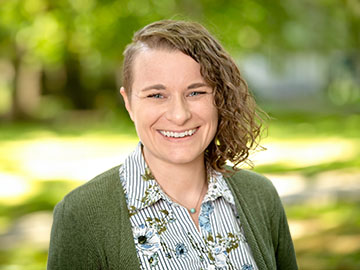
Ashlie Johnson
Ashlie Johnson
Assistant Professor

Pioneer Hall
Dr. Johnson is an applied health and social psychologist who specializes in body image, weight stigma, and eating behaviors. She leverages mixed-methods approaches in her research, combining both quantitative and qualitative strategies. Her current projects include designing strategies to promote weight-inclusive curriculum development in health education, exploring strategies to forming positive body image in nonbinary individuals, and analyzing how college students conceptualize an 'ideal' diet.
At Linfield, Dr. Johnson teaches a range of classes including Survey of Psychology, Introduction to Health Psychology, Seminar in Health Psychology, Research Methods in Psychology, and Quantitative Methods in Psychology. She is committed to inclusive, engaging, and evidence-based pedagogy and is always trying new techniques in the classroom. She also presents her innovative teaching methods at local and national conferences.
Dr. Johnson is passionate about working with undergraduate researchers and teaching assistants. To discuss current or upcoming opportunities, please email her.
As a neurodiverse first-generation college graduate and member of the LGBTQIA+ community, Dr. Johnson is dedicated to expanding opportunities for historically underrepresented students. She is a mentor for the First Scholars program and collaborates with Linfield's Office of Diversity, Equity, and Inclusion to ensure all students have a stellar Linfield experience. She also supervises the Psychology Ambassador program, where student leaders build community and help peers explore the psychology major and department.
When she’s not in the classroom, Dr. Johnson enjoys traveling, listening to audiobooks, playing Jeopardy, spending time outdoors (hiking, biking, swimming, camping), practicing yoga, and relaxing with her cat.
Education
- B.S. in Psychology and Biology, B.A. in Sociology, University of Georgia
- M.S., Colorado State University
- Ph.D., Colorado State University
Publications
Ogle, J. P., Johnson, A. N., Reddy-Best, K. L., Harmon, J., Morris, K., & Kittersong, P. (2023). A qualitative exploration of positive body image experiences among nonbinary individuals. Body Image, 47, 101632.
Johnson, A. N., Clockston, R., Fremling, L., Clark., E., Lundeberg, P., Mueller, M., & Graham, D. J. (2023). Changes in Adults’ Eating Behaviors During the Initial Months of the COVID-19 Pandemic: A Narrative Review. Journal of the Academy of Nutrition and Dietetics, 123(1), 144-194. https://doi.org/10.1016/j.jand.2022.08.132
Johnson Holm, A., Johnson, A. N., Clockston, R., Oselinsky, K., Lundeberg, P., Rand, K., & Graham, D.J. (2021). Intersectional health disparities: The relationships between marginalized identities (sex, race/ethnicity, and sexual orientation) and depressive symptoms. Psychology and Sexuality, 13(4), 1068-1089. https://doi.org/10.1080/19419899.2021.1982756
Oselinsky, K., Johnson, A., Lundeberg, P., Johnson Holm, A., Mueller, M., & Graham, D. J. (2021). GMO food labels do not affect college student food selection, despite negative attitudes towards GMOs. International Journal of Environmental Research and Public Health, 18(4), 1761. https://doi.org/10.3390/ijerph18041761
Menger-Ogle, A., Johnson, A., Morgan, J., & Graham, D.J. (2018). Television advertising of food during children's programming in Nepal. Nutrition, 55, 41-44. https://doi.org/10.1016/j.nut.2018.02.027
Canetto, S. S., Trott, C.D., Winterrowd, E.M., Haruyama, D., & Johnson, A. (2017). Challenges to the choice discourse: Women’s views of their family and academic-science career options and constraints. Journal of Feminist Family Therapy, 29(1-2), 4-27. https://doi.org/10.1080/08952833.2016.1273174
